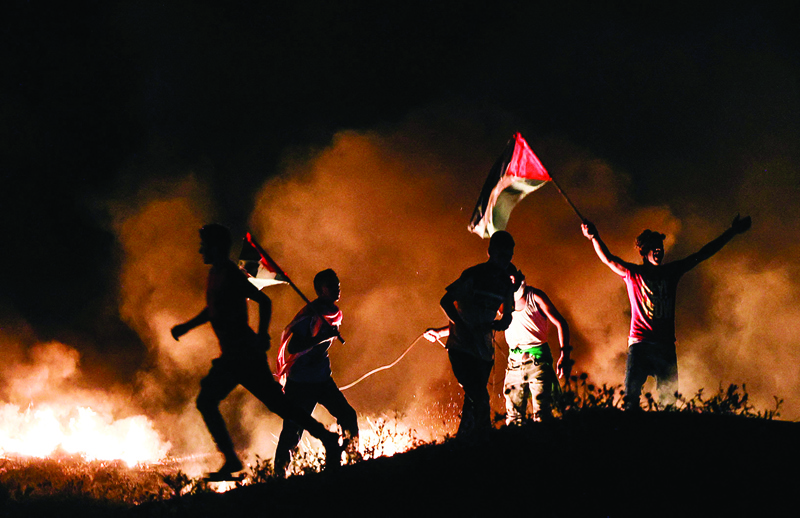 GAZA: Palestinian protesters hold a demonstration on the border with the Zionist entity on Tuesday. - AFP
GAZA: Palestinian protesters hold a demonstration on the border with the Zionist entity on Tuesday. - AFPGAZA CITY: The Zionist entity carried out strikes on Gaza early yesterday, the first flare-up since a major conflict killed hundreds last month. Tensions later rose again in the occupied West Bank, where the Zionist army shot a Palestinian woman. The strikes on the Palestinian enclave of Gaza were the first under the new coalition government headed by Naftali Bennett, who took over on Sunday after ousting longtime prime minister Benjamin Netanyahu.
The renewed violence came a day after more than a thousand Jewish ultranationalist demonstrators bearing Zionist flags poured into Jerusalem's flashpoint Old City, with scores of police deployed and international monitors urging calm. According to Palestinian sources, the Zionist air force targeted at least one site east of Khan Yunis, in the south of the Gaza Strip. The Zionist military said that in response to "arson balloons", its "fighter jets struck military compounds belonging to the Hamas terror organization". It said "facilities and meeting sites for terror operatives" in Khan Yunis were targeted.
In the West Bank yesterday, a Palestinian woman was shot after attempting to drive into Zionist soldiers in a car and attack them with a knife, the military said. The Palestinian health ministry said the woman died of her wounds. The incident took place near Hizma, south of Ramallah. Official Palestinian news website Wafa identified the woman as Mai Afana, 29, from the town of Abu Dis, just outside Jerusalem.
But her uncle Hani Afana told AFP the family rejected the claim that the young mother had tried to kill Zionist soldiers, saying she "took this road by mistake", and that she "did not attempt to carry out an attack". The previous day saw more than a thousand Zionists take to the streets of annexed east Jerusalem in a delayed and controversial march by nationalist and far-right activists. Both the United Nations and the United States had called for restraint before the march, which Bennett's new government authorized.
The march triggered protests in the West Bank and Gaza Strip, and prompted rebukes and warnings from the Zionist entity's allies. Throngs of mostly young religious men sang, danced and waved flags at the Damascus Gate entrance to the Old City, which was cleared of its usual Palestinian crowds. Some chanted "Death to Arabs" before others persuaded them to stop.
Yair Lapid, the architect of the new government, tweeted he believed the march had to be allowed, but that "it's inconceivable how you can hold a (Zionist) flag and shout, 'Death to Arabs' at the same time." Mansour Abbas, whose Islamic conservative party Raam is vital to the new coalition, called Tuesday's march a "provocation" that should have been cancelled.
Morocco's King Mohammed VI yesterday sent Bennett a letter of "warm congratulations" for becoming prime minister, before the new premier called Rabat an "important friend and partner" in return. Morocco last year agreed to normalize ties with the Zionist entity - one of four Arab nations to do so under a Washington-backed deal - in a move condemned by the Palestinians as a "stab in the back". - AFP










